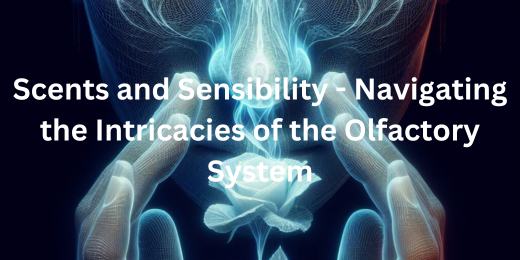Role of the olfactory system
The olfactory system, often referred to as the sense of smell, plays a pivotal role in our sensory perception and emotional experiences. This complex system involves intricate interactions between various components, enabling us to detect and identify a myriad of scents.
Situated within the nasal passages, the olfactory receptors are sensitive to volatile molecules that trigger unique neural responses, resulting in our perception of different odours. The olfactory bulb, a vital part of the brain, processes these signals, connecting scents to memories, emotions, and even certain behaviours.
From triggering nostalgia through familiar aromas to influencing our food preferences, the olfactory system’s significance extends far beyond mere scent recognition. In this exploration of the role of the olfactory system, we discover the mechanisms that enable us to navigate the realm of scents and acquire a deeper comprehension of its significant influence on our everyday existence. The nose is the primary organ for olfaction, which is responsible for the sense of smell, as well as filtering and humidifying the air we breathe.
The Science Behind Smell: Olfactory Anatomy and Physiology
The intricate mechanisms underlying the sense of smell reveal the captivating science of the olfactory system. Comprising a complex interplay between sensory receptors, neural pathways, and brain centres, this system allows us to perceive and interpret odours.
When airborne molecules enter the nasal passages, specialized olfactory receptors detect them and send signals to the olfactory bulb, a brain structure responsible for initial scent processing. These signals are then relayed to the brain’s olfactory cortex and other interconnected regions, ultimately forming the foundation of our olfactory experiences.
This process not only enables us to distinguish between an array of scents but also links these aromas to emotions, memories, and even primal instincts. Understanding the role of the olfactory system involves delving into the remarkable fusion of biology, neuroscience, and perception that underscores our profound relationship with the world of smells.
How Scents Influence Emotions and Memories
The captivating interplay between scents, emotions, and memories underscores the remarkable role of the olfactory system in shaping our psychological experiences. Aromatic molecules hold the power to evoke deep-seated emotions and conjure vivid memories, often with an immediacy that other senses struggle to replicate.
This phenomenon is rooted in the intricate neural connections between the olfactory bulb and the brain’s limbic system, where emotions and memories reside. The olfactory system’s unique pathway bypasses cognitive processing, enabling scents to evoke potent feelings almost instantaneously.
A particular scent can transport us back in time, rekindling forgotten moments and emotions long thought buried. By comprehending the profound role of the olfactory system in linking scents, emotions, and memories, we gain insight into the exquisite complexity of human perception and the indelible impact of fragrances on the tapestry of our lives.
Olfactory Disorders and Their Impact
The impact of olfactory disorders resonates deeply, underscoring the crucial role of the olfactory system in our daily lives. Olfactory disorders encompass a range of conditions that diminish or distort our sense of smell.
These conditions can lead to diminished quality of life, affecting our ability to appreciate flavours, detect dangers like gas leaks, and experience the emotional resonance tied to scents. Common olfactory disorders include anosmia (complete loss of smell) and hyposmia (reduced sense of smell), which can arise from factors such as sinus infections, head injuries, or even age-related changes.
Such disorders not only diminish the sensory pleasures we often take for granted but can also impact our overall well-being and safety. By delving into the realm of olfactory disorders, we gain insight into the complex web of connections that the olfactory system weaves within our perceptions, emotions, and interactions with the world around us.
Enhancing Sensory Experiences: Aromatherapy and Perfumery
Enhancing sensory experiences through aromatherapy and perfumery exemplifies the multifaceted role of the olfactory system in enriching our lives. Aromatherapy, a holistic practice, utilises the therapeutic power of scents to evoke physical and emotional responses.
The olfactory system’s direct connection to the brain’s emotional and memory centres underpins aromatherapy’s effectiveness in promoting relaxation, stress reduction, and even pain relief. Perfumery, on the other hand, marries the art of crafting scents with the science of the olfactory system.
Perfumers curate fragrances that evoke moods, amplify personalities, and conjure vivid imagery. By harnessing the olfactory system’s intricate mechanisms, both aromatherapy and perfumery offer avenues to connect with our inner selves and create moments of well-being.
Through these practices, we unravel the olfactory system’s profound influence on our senses, emotions, and overall sense of fulfilment.
Cultivating Sensibility: Developing a Deeper Appreciation for Scents
Cultivating sensibility through developing a deeper appreciation for scents unveils the profound role of the olfactory system in fostering a more enriched life. Our olfactory sense, often underestimated, has the remarkable ability to conjure emotions, evoke memories, and offer a unique lens through which we perceive the world.
By immersing ourselves in the realm of scents, we awaken a heightened sensitivity that transcends the visual and auditory domains. Delving into the fragrant tapestry of nature, fragrances of everyday life, and even the science behind perfumery, we unlock a deeper connection with our surroundings.
This journey not only enriches our sensory experiences but also opens a gateway to understanding the role of the olfactory system in shaping our perceptions, emotions, and the intricate interplay between our senses.



